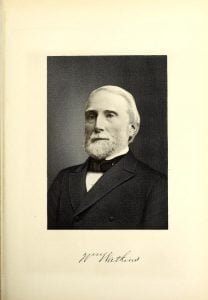Probably no name in the history of New Bedford brings more clearly or forcibly to mind a man of large affairs, of broad charity and generous impulse, of high purpose and of exemplary citizenship, than does that of the late William Watkins, whose long life in commercial and financial circles made him a part of the progress and development of this community.
One William Watkins came from England to Rhode Island during the Revolutionary war, and for many years taught school in Newport and Little Compton. He was born Jan. 1, 1744, and on Aug. 12, 1780, at Little Compton, married Abigail Seabury, who was born Feb. 7, 1749, daughter of Samuel and Lydia (Ladd) Seabury, of Little Compton. To this union came two children:
- Thomas, born Sept. 9, 1781
- Sarah, born Dec. 7, 1786.
Samuel Seabury was a son of Joseph and Phebe (Smith) Seabury, the former of whom removed to Little Compton, R. I., from Duxbury. He was a son of Dr. Samuel Seabury, of Boston and Duxbury, who married for his second wife Martha Pabodie, daughter of William and Elizabeth (Alden), and granddaughter on her maternal side of John and Priscilla (Mullins) Alden, of the “Mayflower.”
Thomas Watkins, son of William and Abigail (Seabury) Watkins, born Sept. 9, 1781, married Nov. 3, 1811, Mary, daughter of Gideon and Isabel (Mosher) Davis, of Westport, Mass. Thomas Watkins, or Capt. Thomas Watkins, as he was known, became a master mariner, and was well and favorably known in all the ports in this vicinity. He resided for a number of years in the village of Westport Point. His children were:
- Abigail
- William
- Thomas
- Betsy
- Mary
- Lydia
- George D.
- Isabelle

William Watkins, son of Capt. Thomas and Mary (Davis) Watkins, was born in the village of Westport Point, Mass., June 22, 1814. He attended the country schools until he reached the age of fourteen years. In 1828 he entered the grocery store of Jacob Parker, of New Bedford, who also carried on a commission business, and he continued in his employ until March, 1832, when a position as clerk for Elisha Dunbar & Co. (Edward C. Jones) was tendered him, which he accepted. This firm did business as ship chandlers and importers, as well as managing owners and agents for whale shipping. Mr. Watkins remained in that employ for eight years, acting as bookkeeper, and being mainly in charge of the merchandise business, having a partial interest in the profits of that department for the last three years. The senior member of the firm, Capt. Elisha Dunbar, died in November, 1839, and at the close of the business year, Feb. 1, 1840, the firm was dissolved. Mr. Jones continued the business, devoting much energy to the whaling interests with a view of increasing same largely. Mr. Jones made several fair proposals to Mr. Watkins to join him in partnership, but he decided to follow the business with which he was most familiar, and hence he established himself in the ship chandlery and iron trade in 1840. This business he continued with good success until 1878, his brother George D. Watkins being associated with him as a partner (1851-1862) under the firm name of W. & G. D. Watkins. During the growth of the business a number of whaling vessels were added, but in 1873 Mr. Watkins began to dispose of his whaling interests and sold his last ship in 1880. He disposed of the ship chandlery and iron business in 1878, selling to Watkins & Handy (George D. Watkins and Jonathan Handy). The close of Mr. Watkins’s active mercantile career may properly be said to have come at this time, although he subsequently managed large and valuable estates in a private fiduciary capacity, and became prominently identified with banking interests. He gained and always maintained a standing in this community of the highest character. Throughout his entire business career he acted the part of an able, honorable and upright man, never withholding his means or his influence from any worthy work. Being of a retiring nature he was never conspicuous in public movements or in political affairs.
In 1846 Mr. Watkins was made a trustee of the New Bedford Institution for Savings; in 1870 a member of its board of investment, and in January, 1877, was chosen its president to succeed William C. Taber, and he served in that capacity upward of nineteen years. In 1852 he was made a director of the Mechanics’ Bank (now the Mechanics’ National Bank), and in 1879 was elected unanimously president of the First National Bank. He remained in that position eleven years, and then declined longer service, but remained on the board of directors. He was a director of the Potomska Mills Corporation from its organization.
Mr. Watkins married Melissa M., daughter of Lemuel and Melissa (Gill) Kollock, of New Bedford. She died in May, 1873. Their children numbered three:
- Melissa K.
- Emma C
- A son who died in infancy
Mr. Watkins died April 23, 1900.
